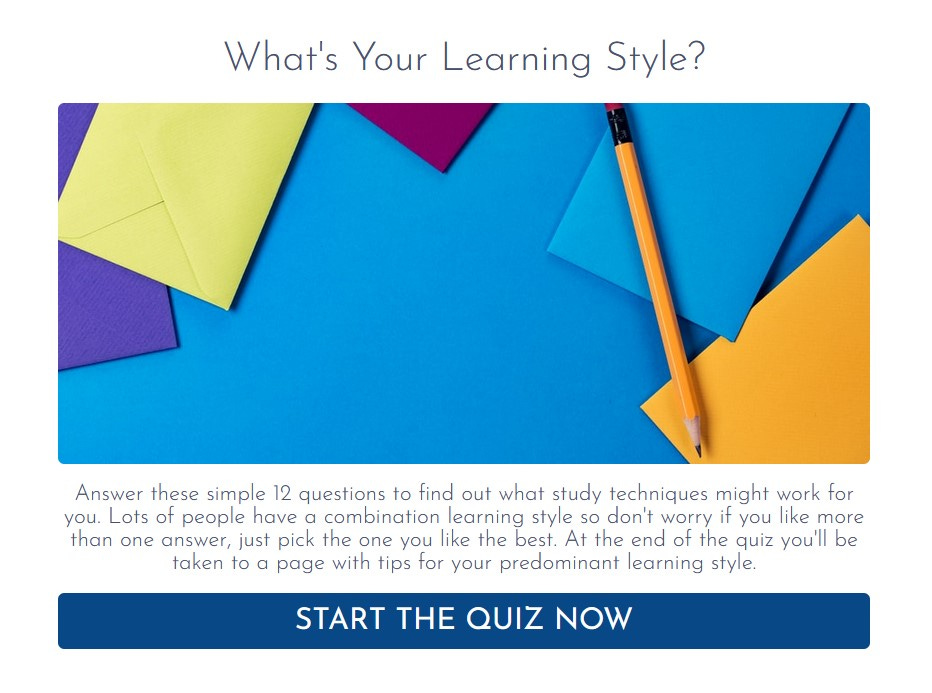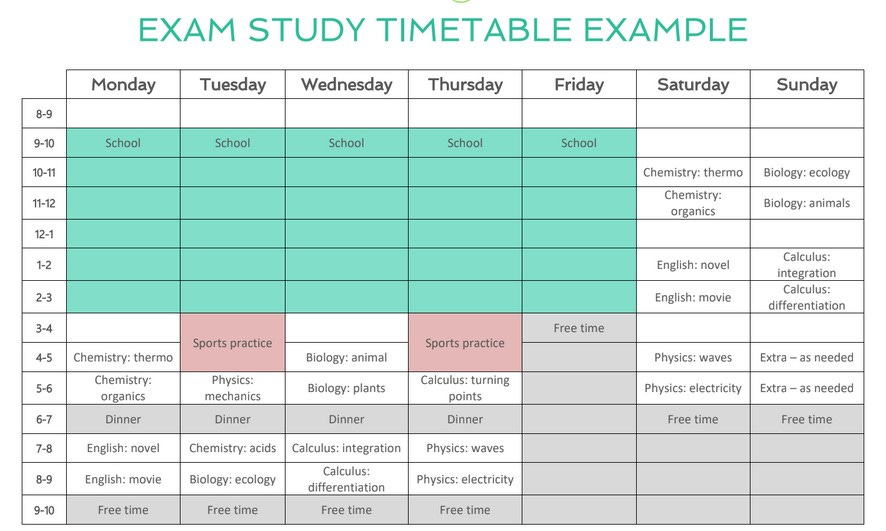5 ways your teen can take control of exam-time stress
5 common contributors to exam-time stress and my practical solutions for them.
Let’s be honest. Sitting exams isn’t fun, and preparing for them can be even worse.
Sometimes a little bit of pressure can spur your teen on to study; give them a bit of motivation. But once this pressure starts turning into stress, that stress can have really negative ramifications on your teen and their study.
Here are 5 of the most common stress-causing complaints from students leading up to exams and my suggested solution to each one.
1. I’m not going to fit everything in
When students embark on their exam study, it’s incredibly common for them to feel like their head will explode when they try and figure out how on Earth they’re going to study everything they need to in the short amount of time they have to prepare.
—> My solution: Make an Exam Study Timetable
An Exam Study Timetable is what it sounds like; a schedule your teen makes setting out what topics they’re going to study and when during their exam study.
Not only will having an Exam Study Timetable help your teen’s organisation, it is a wonder stress-reducer.
If your teen makes a plan to fit everything in that they need to, then it’s a matter of sticking to the timetable. It can really help take the stress of feeling like you don’t have time out of your head. The key is sticking to the timetable, and from that point slow and steady wins the race.
I vividly remember feeling a wave of relief wash over me after making an Exam Study Timetable. It was a way of taking out a lot of the clutter and stress in my head and putting it on paper.
2. I don’t know where to start
I reakon this is one of the main reasons that prevents students from starting studying in the first place.
If you don’t have a game plan for exam study and you don’t know where among the huge pile of stuff to get through where to start, well, that is a sure fire recipe for stress.
Think of going on a road trip for a second. If you don’t know where you’re going, where do you start? Without a target you’ll end up just sitting in the driveway.
—>My solution: Make a Subject Map
“I don’t know where to start” is another way of saying “I don’t know what I should be studying”.
Making a Subject Map will set out for your teen exactly what they need to study, therefore eliminating the problem of not knowing where to start. Usually it’s my suggestion that your teen starts their exam study by making an Exam Study Timetable, and their Subject Map.
A Subject Map is simply a breakdown of each subject your teen has an exam for. It should set out each main topic and all of the sub-topics underneath those.
Subject Maps will give your teen a map for the journey of exam study ahead; the idea being that they work through their Subject Maps systematically, therefore ensuring they study everything they need to before the exam.
It will also ensure they don’t forget to study something really important, and prevent them from studying topics that aren’t relevant to the upcoming exam.
And what about stress?!
Well all of these benefits of Subject Maps are massive stress-busters. Subject Maps take a little bit of time to make, but they pay back that time with dividends because of the organisational and stress-reducing benefits they provide.
3. There isn’t enough time!
There never seems to be enough time when you’re studying for exams. There is usually a huge amount of work to revise and not tonnes of time to do it in.
This can, understandably, cause students to feel stressed.
Feeling stressed like this can lead to inertia; motivation-itis. Feeling overwhelmed and not going where to start.
—>My solution: Just start. Just start now.
Today is good.
Effective study requires time and repetition, which isn’t possible in a few days.
Linking back to point 2 above, I think that starting studying is the hardest part (and I talk about that here too). Moving from stationary to first gear is hard, but once you start moving and gain momentum you can find your study groove.
If your teen is a procrastinator and tends to leave things until last minute, they need to look ahead and think about how much worse the situation will be in however many days / weeks until the exam when they’re not prepared and still have heaps to do.
They need to harness that and use it to help them start studying now, and not leave it til later when things will be even worse.
4. There’s just too much pressure!
Whilst a some students suffer from a lack of motivation and seem to feel no pressure when it comes to doing well at school and in exams… obviously there are a lot of students who are at risk of having a stroke with the amount of pressure they put themselves under.
—> My solution: Get some perspective
If your teen is motivated, generally enjoys school, and has a sense of wanting to do well at school, it my sincere belief that they are going to make a success of themselves one way or another.
Yes exams are stressful and yes they’re important, but if they have a good work ethic things will work out. One exam is not worth having a meltdown over.
As I have said before, no one needs to get perfect grades. That’s just not a thing. Getting consistently decent grades it much more important than focusing on getting an A+ all the time.
I know there is a tonne of teen anxiety out there, and I am not trying to undermine that or even go there. Not my expertise. I am just saying that sometimes a bit of persepctive can be helpful. We can all get caught up in things, and it’s easy for teen to get so focused on exams that they lose sight of everything else.
My promise to your teen is that everything will be okay. These exams are not the end of the world.
5. I just don’t know what to do
Coming from a teen facing exams, I think this statement actually means “I don’t know how to study”.
Suuuuuuuch a common problem for high school students — particularly during their first year of proper exams.
The whole reason I do Cram Lab is because generally, students aren’t taught how to study (subject of big rant here). So it’s not your teen’s fault if they don’t know how to go about studying for exams — no one has told them how to study before!
—> My solution: Figure out what your predominant Learning Style is and start there
My ultimate mantra here at Cram Lab is that we all study and learn most effectively in a unique way. The same study techniques that will help your teen get the grades they are actually capable of might be totally wrong for another student.
Your teen needs to develop their own Study System, and as part of that they can leverage off knowing what their predominant Learning Style is, and using the study techniques associated with that Learning Style.
Finding out what your teen’s predominant Learning Style is will give them some tools so they can start figuring out how they best study in a way that works for them — what study techniques will help them understand and retain information most effectively, and which ones probably won’t.
LUCKILY — your teen can head over to cramlab.org and take my free Learning Styles Quiz right now to find out what study techniques might work for them.

AND — you can both head over to cramlab.org to read all about why having a Study System is so important and look at all of the free resources I have to help your teen start developing their Study System today.

Those last two links are the best places to start if your teen doesn’t know where to start when it comes to studying.
As with all of my study tips, these tips are not complex. That is because effective study does not need to be complex and only come to students who get straight A’s (and there are very few of those).
Yes studying can be stressful and not always fun, but I hope with these practical tips your teen can take control of their study and their stress levels and work towards getting the grades they are actually capable of.
Thanks so much for reading.
Clare




